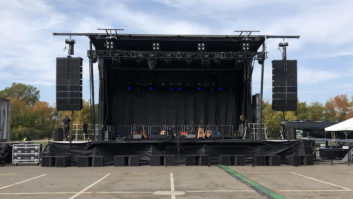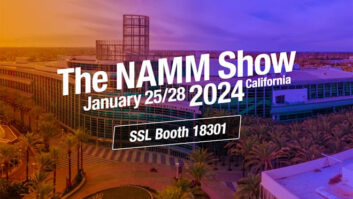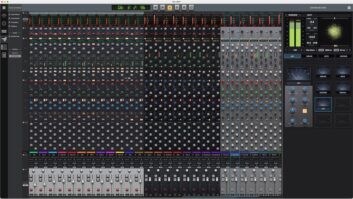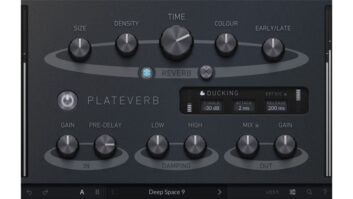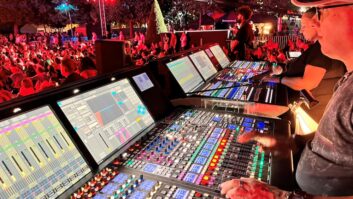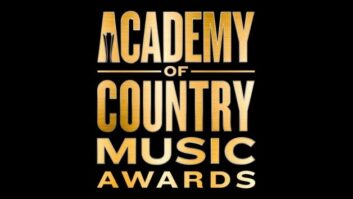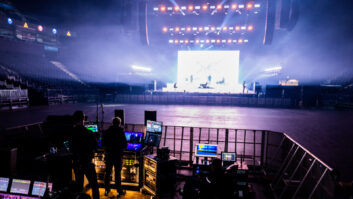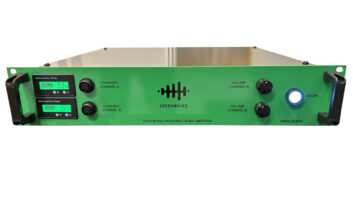By Christopher Walsh.
Green Day, one of a dwindling number of rock and roll outfits that has demonstrated real staying power and lasting influence, will release a new album this year.
Word of the band’s next offering reminded me of a chat with Butch Vig from last autumn, in which the musician/producer confided that he was indeed working with the band. More recently, Vig e-mailed that they “hope for a late May/June release, but we haven’t penciled it in yet.”
In previous conversations with the talented Mr. Vig–we spoke about his Smart Studios in Madison, WI, for the December 2007 “Studio Showcase,” and more recently about his work with young rockers the Subways and the state of the recording industry–this audio professional revealed himself to be one of the most talented, professional, knowledgeable and just plain nice guys in the business.
Very often, a lot of editorial content never makes it into print; fortunately, we’ve got infinite space here, so get comfortable!
“It’s rock and roll,” Vig said of the Subways’ All of Nothing (Sire Records). “I fell in love with the band when I saw them live. They have a unique way of how they approach the power trio format. Billy [Lunn] plays guitar chords that are not necessarily just bar chords–they always have these diminished notes and sevenths and ninths. They’re dense chords. Charlotte [Cooper] rarely plays the root of the bass note, she moves around and does all these slides and cool little hook-y things. Josh [Morgan] plays like Keith Moon–he’s always playing fills and a lot of syncopation of the kick and snare. He doesn’t have a hi-hat, he just constantly washes on the cymbal.
“When I first saw them live, it was a huge sound for a three-piece, almost orchestral sounding. So I fell in love with them live, and fell in love with a track on their first record, ‘Rock and Roll Queen.’ And then just kept bugging them about songs, where they were going. It fit into our schedule nicely, and it was cool. I love working with them.”
On chemistry: “You can put a bass player, drummer and guitarist in a room and they’ll all have their own way of playing. The way that they play can be massive and crushing, and it sounds like there are more than three people on stage playing. I think it’s cool that they can do that.”
On recording All or Nothing: “We recorded at Conway. It’s one of my favorite studios in Los Angeles. Whenever the schedule works out, that’s probably one of my top two or three rooms I like to work in. The rooms are great for using the live ambiance on the drums and guitars and things. They just have a very cool, natural decay to them. I find that you don’t have to do a lot of outboard processing to get the right ambiance for rock and roll. I think we were in [Studio] C, the big tracking room there.
“I’m in the middle of a Green Day record now–we just started tracking about a month ago [Fall 2008] and are just getting a head of steam. We’re going to try to track through Thanksgiving. It’s going good–we’re making a pretty interesting sounding record. It’s a little too early to tell exactly how it’s all going to sound. But Billie [Joe Armstrong] and the band have written some great songs. Billie again has written some amazing lyrics. I think it’s going to be good.”
On the state of the recording business: “It’s tough out there. One thing you can sort of count on is if you’re a good live band you’re going to find something of a core audience out there. And the Subways are a good live band. I think anybody who sees them is going to be impressed and is going to want to get the record. That’s one thing I was aware of when we made the album–I wanted to capture some of that energy of how they play. There are a couple more studio songs on the record–‘Lost Boy’ at the end, ‘Strawberry Blonde,’ which I love, a more epic sounding track and more produced than some of the rock things, just in terms of the arrangement. We really wanted to capture the energy–like ‘Girls and Boys,’ when they play that song live, it’s pummeling. In the studio, I wanted to blow that up and make it more larger than life, to a certain extent. It’s great when you see them play, it shreds onstage!
“Is business not as good now,” he is asked, “even for a professional at your level?”
“If I had an idea to remedy it, I’d patent it right away! I think everyone is trying to figure out how to deal with whatever the new business model is going to be. But there’s still a huge appetite for music out there. Kids want to hear music, especially stuff that sounds fresh and exciting. In some ways, maybe forcing everyone to reassess how they make records, how they market them and what kind of records they put out has sort of leveled the playing field to a certain extent. I think you’re going to see a lot of indie labels starting up and putting out cool music–I’m already seeing that. And then forcing the majors to try to be more creative and also maybe take some chances with bands and not put out the force-fed pop pablum that it’s easy to keep regurgitating. But in terms of how the income stream is going to flow to everyone–managers, labels, artists, producers–that’s all changing quite dramatically. You have to look at ways to keep moving forward, and not necessarily counting on CD sales, because obviously that’s a slowly dying breed. It’s probably going to take, I think, another five to 10 years to really figure out some of the new possibilities. It could be one of thee things that, because of the digital realm, is constantly evolving.
“That’s one of the things I found both on the Subways record, and also I produced Against Me! [New Wave] before that: we had to be really efficient with the studio time. The budgets were modest, but you can’t be extravagant anymore. Not that I ever was–I never made those kind of records where you’re ordering $300 bottles of red wine every night. I’ve always taken a very pragmatic look at recording–you have to be really efficient with your time. A lot of studios are trying to find ways to supplement, to be creative and not necessarily just count on doing rock sessions, or pop or hip-hop sessions. There are a lot of sessions you can book that are related to television, film, advertising, which is still booming right along. To think that as a studio you can survive as a ‘rock room,’ I think, is folly, these days. I still own Smart Studios, and we’ll book anything in there. Mike Zirkel, the studio manager, is constantly looking for new clients, and any type of music: we have schools, choirs come in. I think you just have to do that; you can’t count on the old tried-and-true sessions we used to book there pretty constantly.
“A lot of TV shows have really cool, cutting-edge music. A lot of it is electronic. Cool programming, or they go out in the field and record interesting sounds, and come in and do sound design and come up with interesting, fresh soundscapes, sometimes, that are in the shows. So there are all these niches you can find, little pockets of things to do that will all fit in, in some forum, into the music business.
“Kids ask me, ‘How do I get into the business?’ I tell them don’t get into it just to produce rock bands or hip-hop artists or whatever. If you really love music you should also look at film and television and advertising, and jazz and country and blues and everything. Keep your palette wide open and you’re going to find a lot more opportunities to find cool work.”
“Do you work at home?”
“I do. I have a Pro Tools|HD system. It’s in a bedroom downstairs. It’s pretty bare-bones–I can’t really track a band here, but I do a lot of editing. When the budgets get tight, I’ll bring the hard drive home and Billy Bush, my engineer, and I will do editing, or cleanup or vocal comps. I usually do rough mixes here. I’ve done some mixing here too, because I have fairly extensive plug-ins in my HD system. I’ve done vocals and guitar overdubs here, but I’ve got a bare-bones setup. [I have] a couple Chandler preamps, a Culture Vultureand a Summit [Audio] TLA-100 limiter, which I like. I have this old Roger Meyer compressor that I got when I was working with Sonic Youth years ago in New York. I rented it–it makes everything sound like an early Who record on the drums. Billy Bush and I have the same one. We used that on a couple of the Subways tracks and Against Me! songs. It hypes up everything!
“[But] the great rooms like Ocean Way or Cello or Conway or Sound City–you can’t replace those. There’s something about the magic when you go in there–the acoustics, the vibe, the energy. There’s always going to be artists who want to record in that kind of space. Whether you go in for a week or two weeks, track and then move to a smaller place for overdubs and mixing, you really can’t duplicate those inside Pro Tools, inside a plug-in. People try to but there’s still something about capturing a pure acoustic moment that I think is still really exciting.”
